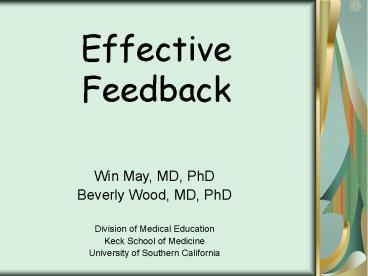Effective Feedback - PowerPoint PPT Presentation
Title:
Effective Feedback
Description:
Title: Effective Feedback Author: Elza Mylona Last modified by: Beverly Wood Created Date: 9/24/2004 5:34:02 PM Document presentation format: On-screen Show – PowerPoint PPT presentation
Number of Views:965
Avg rating:3.0/5.0
Title: Effective Feedback
1
Effective Feedback
- Win May, MD, PhD
- Beverly Wood, MD, PhD
- Division of Medical Education
- Keck School of Medicine
- University of Southern California
2
Objectives
- Perform a self-assessment of your feedback skills
- Discuss your use of feedback as a teaching tool
- Discuss barriers to feedback
- Practice giving effective feedback
3
Feedback 3 definitions
- Concept Characteristic
- Information - Focus is message content
- Reaction - Focus is interaction with
information - Cycle - Focus is receiving
information, - responding to data,
and improving - response quality
- J M M van de Ridder et al(2008)
4
Feedback Definition
- Guide for teachers and students
- Focus for learning activity
- Developmental guide to achievement
5
Feedback
- What students have achieved
- What students might achieve
- What students are ready to achieve
- (Crooks, 1988)
6
Feedback Goal
- Support and foster students
- self-directed learners
7
Objectives of Feedback
- Helps learners to
- Determine expected standards
- Identify gaps between standard and actual
performance - Improve learning and performance
- Helps teachers to
- Adapt teaching to learners needs
- Keep up with learners progress
8
NEEDS
What ought to be
What is
9
What is believed to be real
Fox, R.D. and Miner, C. Motivation and the
Facilitation of Change, Learning and
Participation in Educational Program for Health
Professionals. Journal of Continuing Education
in the Health Professions, Vol. 19, No. 3. Summer
1999
10
In other words
- Feedback in clinical education is
- Speci?c information about the comparison
between a trainees observed performance and a
standard, given with the intent to improve the
trainees performance. - J M M van de Ridder et al(2008)
11
Faculty barriers to feedback
- Time constraints
- Absence of standards for competent performance
- Lack of direct knowledge of learners performance
- Discomfort in giving constructive (negative)
feedback - Unfamiliar with providing effective feedback
12
Learner concerns with feedback
- Non-specific - does not help learning or
performance - Personal - statement about worth or potential
(embarrassing or humiliating) - Not linked to learning outcomes
- Not timely - too late to change performance
- Not progressive - no sense of what they have
achieved in progress towards a goal or have yet
to achieve.
13
Activity
- On the card, as a pair, write what you consider
to be the basic principles of feedback.
14
Principles of feedback
- Planned - learners need to know
- when feedback will be given
- who will give it
- what will be given
- how it will be given
15
Principles of feedback
- Timely and prompt - as closely as possible to
performance. - Specific - describes behaviors.
- Constructive -provides guidelines for
improvement. - Limited to changeable behaviors.
- Manageable - 1 to 3 behaviors.
16
Principles of feedback
- 7. Empathize with learner
- 8. Verify - learners understand feedback.
- 9. Plan - action plan with learner.
- 10.Follow up - check with learner on achievement
of plan.
17
Timing of feedback
- During/soon after patient contact
- End of each half day or day
- Mid rotation
- End of rotation
18
Who can contribute?
- Self
- Peers
- Faculty
- Other team members
- 360-degree feedback
19
Feedback Session
- Be clear about purpose
- Get learners perspective on how things are going
- Use sandwich technique
- Ask recipient to rephrase feedback
- Ask recipient for solutions
- Develop a learning plan together
- Schedule a follow-up meeting
20
What would you consider as ineffective vs
effective feedback?
21
Ineffective vs Effective feedback
- Ineffective Effective Competencies that are
Well observable tasks and - not observable
competencies - Uninformed or non-expert Expert
observer and - observer
feedback provider - Global information Highly speci?c
information - Implicit standard
Explicit standard - Second hand information Personal
observation - No aim of performance Explicit
aim of performance improvement improvement - No intention to re-observe Plan to
re-observe
22
- Without feedback, mistakes go uncorrected, good
performance is not reinforced and clinical
competence is achieved incidentally or not at
all. - Jack Ende, 1983
23
Case Scenario
- John is a very energetic learner, to the point of
being aggressive. He prepares extensively for
teaching sessions, reads exhaustively and
participates actively in discussions. In fact, he
tends to monopolize discussions often ignoring
comments of his classmates. - In pairs, discuss how and what feedback you will
give to him.































